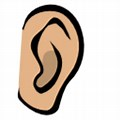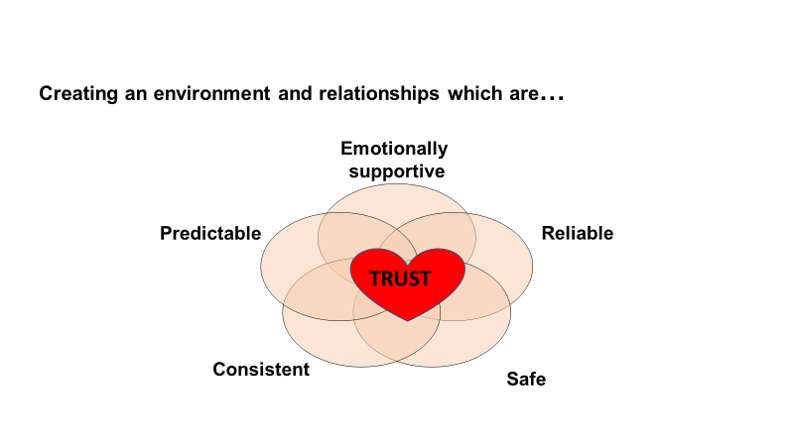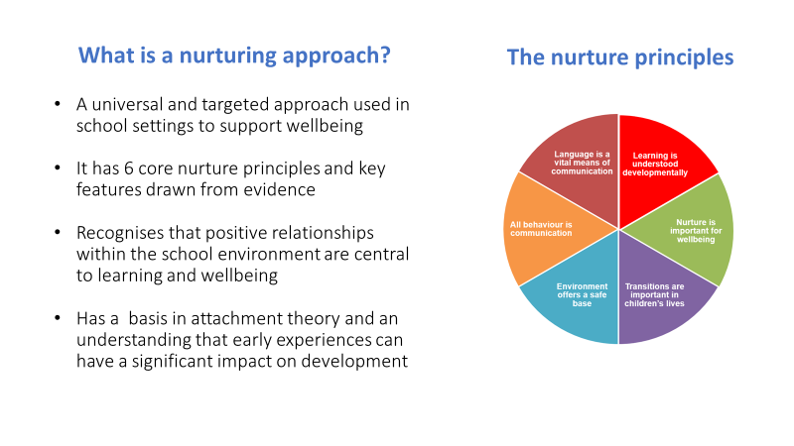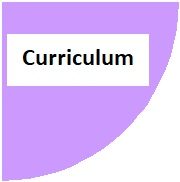How Good Is Your Mental Health and Wellbeing provision?

This section will assist you to consider your whole school approaches and universal provision for promoting all learners’ mental health and wellbeing. Effective, evidence informed culture and curricular approaches for mental health and wellbeing approaches are critical in both addressing and preventing most anxiety concerns for children and young people.
Introductory resource
Children and Young People’s Mental Health and Wellbeing: A Professional Learning Resource for all School Staff. The resource takes a whole school approach centred around prevention and early intervention to promote positive mental health and wellbeing for everyone in the school community. It aims to provide school staff with knowledge and understanding of mental health and wellbeing in schools and a range of opportunities to learn about experiences and advice from practitioners and young people. There are four main sections split into bitesize topics. The core content should take around 6-7 hours to complete and there are suggestions for further learning. Learners can move through topics at their own time and pace in any order. Includes An Overview of Mental Health and Wellbeing; Factors Influencing Mental Health and Wellbeing; Applying Prevention Based Approaches to Mental Health and Wellbeing in Schools; School Staff Wellbeing.
Undertaking a mental health and wellbeing self-evaluation audit for your establishment
Every education establishment is unique. The needs of the whole school community and individuals within it need to be considered based on the current strengths and needs that exist. A personalised plan can then be developed to enhance elements of mental health and wellbeing provision within your own establishment as your commitment to improvement.
Thinking about each of the elements of mental health and wellbeing provision within your own establishment in a methodical way, is needed to undertake an audit well.
The information and resources below will support this task. Your link educational psychologist can also assist you.
As well as the guidance below, A Whole School Approach Framework for Schools to Support Children and Young People’s Mental Health and Wellbeing (published by Scottish Government August 2021).
What makes this successful?
Relevant quality indicators have been extracted from How Good Is Our School (4th edition) (Education Scotland) and How Good Is Our Early Learning and Childcare (2016) (Education Scotland). These are available below.
Elements of mental health and wellbeing provision in education establishments
There are some reflective questions and information about each of the elements below to assist you in getting started….
- Think about each element – what are the strengths and areas for improvement in your establishment?
- It is advisable to seek the views of various people – staff, young people, other people in your school community
- It is important to be open to the need for change and objective when thinking about this
- Use different sources and documents to widen and deepen your thinking (see resources to assist you below)
 If someone was walking around the school, to different locations, what would they
If someone was walking around the school, to different locations, what would they
 See?
See?  Hear?
Hear?  Feel?
Feel?
Environmental audit

For most children, attending education establishments with strong relationship-based practices including nurturing approaches, will effectively meet the majority of children’s wellbeing needs.


Applying Nurture As a Whole School Approach: A framework to support the self-evaluation of nurturing approaches in schools and early learning & childcare settings (Education Scotland & Glasgow City Council). Relationships and belonging

Ensure your establishment is guided by the Curriculum for Excellence health and wellbeing experiences and outcomes in order that children and young people develop the knowledge and understanding, skills, capabilities and attributes which they need for mental, emotional, social and physical wellbeing now and in the future. Each establishment, working with partners, should take a holistic approach to promoting health and wellbeing, one that takes account of the stage of growth, development and maturity of each individual, and the social and community context.
The staff from the education establishments who participated in the pilot phase of the anxiety toolkit provided this list of universal approaches and curricular resources that they use. Please contact us if:
- you use universal approaches or curricular resources that you recommend are added to this list
- you can provide a short review of universal approaches or curricular resources that have improved pupil outcomes
- you can provide tips for how to use or adapt any universal approaches or curricular approaches to improve pupil outcomes.

Staff wellbeing is critical for all education staff. Ensuring staff wellbeing requires investment at a school level, between colleagues and at the individual employee level. The wellbeing of staff engaging with children, young people and their families where mental health and wellbeing concerns exist requires particular consideration. An enhanced focus on wellbeing should be expected and effective when people encounter additional life changes or challenges. Adults and children can enhance their wellbeing by investing in the following wellbeing self-care elements (see NHS five ways to wellbeing):

We have staff wellbeing resource links available here. Some of these staff wellbeing resources have been created in response to the coronavirus pandemic. The content is also valuable for staff investing in their wellbeing continuously or to enhance wellbeing as required.
How Good Is Your Mental health and Wellbeing? – Resources to assist you
How Good Is Our School (4th ed., Education Scotland)
- 3.1 Ensuring Wellbeing, Equality & Inclusion
- 2.4 Personalised Support
- 2.2 Curriculum
- 2.1 Safeguarding and Child Protection
How Good is Our Early Learning & Childcare (2016, Education Scotland)
- 3.1 Ensuring Wellbeing, Equality & Inclusion
- 2.4 Personalised Support
- 2.2 Curriculum
- 2.1 Safeguarding and Child Protection
Curriculum for Excellence health and wellbeing experiences & outcomes (extracts)
Scottish Government (2020) provided Children and Young People’s Mental Health and Wellbeing: A professional learning resource for all school staff. This is a resource centered around a whole school approach, prevention and early intervention to promote positive mental health and wellbeing for everyone in the school community.
‘Know your Gaps’ recording sheet
A powerpoint video to assist you in identifying and responding to gaps you identify in your self-evaluation audit.

